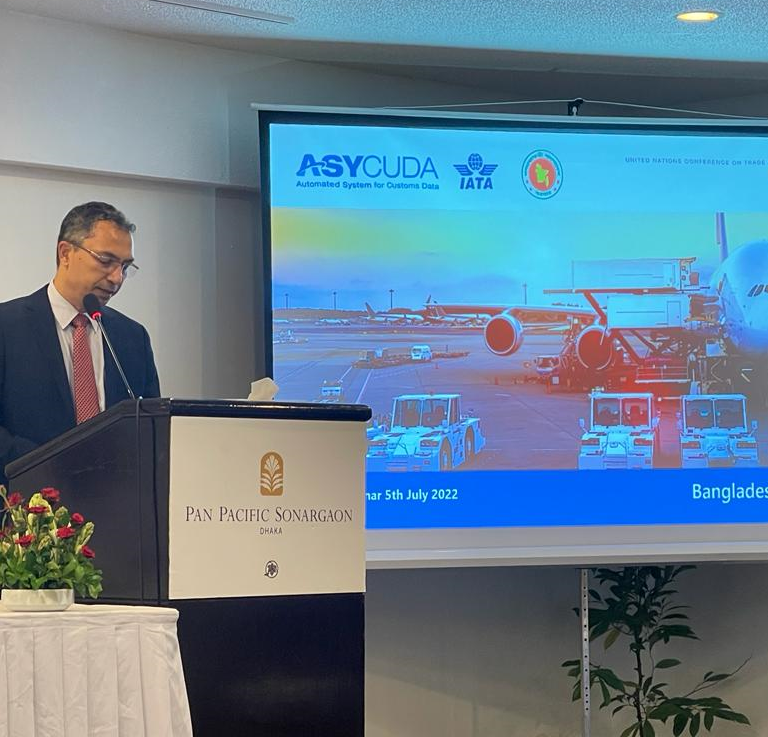
News
Improved Customs Technology to Increase Consistency, Risk Management

The IATA Cargo XML solution in ASYCUDAWorld has been launched today to help airlines, express operators, freight forwarders and shippers to easily provide Bangladesh’s customs authorities with information that is technically correct and in line with the standards of international bodies such as the World Customs Organization (WCO) and United Nations. The system will also better enable customs to carry out risk assessments for air cargo shipments and improves compliance with security regulations.
The IATA Cargo-XML solution modernizes data exchange for air cargo clearance by using IATA standards in combination with the ASYCUDAWorld customs management system. ASYCUDAWorld was developed by the United Nations Conference on Trade and Development’s ASYCUDA Programme (UNCTAD ASYCUDA), whose software is currently being used by 101 countries worldwide to accelerate customs clearances and increase the pace of secure, international trade.
The integration of IATA Cargo-XML messages in ASYCUDAWorld standardizes electronic communications between airlines and customs authorities. The IATA Cargo XML solution is currently implemented in Angola, Jamaica, Rwanda, Uganda – and now Bangladesh. This joint IATA-UNCTAD ASYCUDAWorld module is a critical support to helping developing countries meet their international obligations while improving air cargo security, modernizing customs procedures, and ultimately fostering participation in global commerce through the submission of advanced electronic data related to air cargo shipments.
The adoption of IATA Cargo-XML messaging in Bangladesh will promote stronger compliance in the region. It makes it easier for airlines, freight forwarders, express operators, and shippers to ensure that the information being provided to customs before the arrival of air cargo shipments in country is of high quality and in line with the security standards set by the World Customs Organization. It also reduces message duplication and simplifies communication across the supply chain.
Mr. Ouassim Gahbiche, UNCTAD ASYCUDA team lead for performance and measurements said, “Through the launch of this module our cooperation with IATA is once again serving the interests of both the national administration and air cargo supply chain actors, this time in Bangladesh. The use of advanced cargo information to facilitate pre-arrival processing and accelerate the release of cargo is consistent with Bangladesh’s obligations under the World Trade Organization’s Trade Facilitation Agreement. The IATA Cargo-XML module also improves adherence to security requirements set out in the World Customs Organization’s SAFE Framework of Standards, further ensuring global supply chain security”.
The implementation of IATA Cargo-XML standards in Bangladesh was supported by UNCTAD and IATA experts during a workshop delivered in early July and subsequently through tailored capacity building sessions. The system is already operational for most airlines flying to Bangladesh.
The IATA Cargo XML solution in ASYCUDAWorld has been launched today to help airlines, express operators, freight forwarders and shippers to easily provide Bangladesh’s customs authorities with information that is technically correct and in line with the standards of international bodies such as the World Customs Organization (WCO) and United Nations. The system will also better enable customs to carry out risk assessments for air cargo shipments and improves compliance with security regulationso.
The IATA Cargo-XML solution modernizes data exchange for air cargo clearance by using IATA standards in combination with the ASYCUDAWorld customs management system. ASYCUDAWorld was developed by the United Nations Conference on Trade and Development’s ASYCUDA Programme (UNCTAD ASYCUDA), whose software is currently being used by 101 countries worldwide to accelerate customs clearances and increase the pace of secure, international trade.
The integration of IATA Cargo-XML messages in ASYCUDAWorld standardizes electronic communications between airlines and customs authorities. The IATA Cargo XML solution is currently implemented in Angola, Jamaica, Rwanda, Uganda – and now Bangladesh. This joint IATA-UNCTAD ASYCUDAWorld module is a critical support to helping developing countries meet their international obligations while improving air cargo security, modernizing customs procedures, and ultimately fostering participation in global commerce through the submission of advanced electronic data related to air cargo shipments.
The adoption of IATA Cargo-XML messaging in Bangladesh will promote stronger compliance in the region. It makes it easier for airlines, freight forwarders, express operators, and shippers to ensure that the information being provided to customs before the arrival of air cargo shipments in country is of high quality and in line with the security standards set by the World Customs Organization. It also reduces message duplication and simplifies communication across the supply chain.
Mr. Ouassim Gahbiche, UNCTAD ASYCUDA team lead for performance and measurements said, “Through the launch of this module our cooperation with IATA is once again serving the interests of both the national administration and air cargo supply chain actors, this time in Bangladesh. The use of advanced cargo information to facilitate pre-arrival processing and accelerate the release of cargo is consistent with Bangladesh’s obligations under the World Trade Organization’s Trade Facilitation Agreement. The IATA Cargo-XML module also improves adherence to security requirements set out in the World Customs Organization’s SAFE Framework of Standards, further ensuring global supply chain security”.
The implementation of IATA Cargo-XML standards in Bangladesh was supported by UNCTAD and IATA experts during a workshop delivered in early July and subsequently through tailored capacity building sessions. The system is already operational for most airlines flying to Bangladesh.




